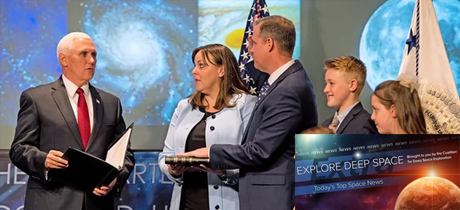In Today’s Deep Space Extra…Jim Bridenstine was sworn in Monday as NASA’s Administrator by Vice President Mike Pence. NASA ground systems development for the Space Launch System (SLS) may offer options to launch planetary science as well as human deep space missions.
NASA Has a New Administrator
Spacepolicyonline.com (4/23): As he sworn in Jim Bridenstine as NASA’s new administrator, Vice President Mike Pence offered NASA praise from President Trump and assurances the nation’s chief executive is committed to ensuring the U.S. remains pre-eminent in space. “You have an advocate and an ally,” Pence said of the President. “NASA represents what is best about the United States of America. We lead, we discover, we pioneer, and we inspire,” Bridenstine told those from the agency at the Washington ceremony and watching a webcast. “I look forward to our journey together.”
The Bridenstine era begins at NASA
The Space Review (4/23): The long wait for a permanent NASA Administrator ended on Monday afternoon, as Jim Bridenstine was sworn in by Vice President Mike Pence. Nominated in September, he encountered a political roadblock that lifted last week. While the U.S. Senate languished over his nomination, many of the decisions about NASA’s future were made under the auspices of the recently re-established National Space Council and President Trump. The agency will return to the Moon with astronauts as it prepares for the human exploration of Mars.
Human Space Exploration
NASA’s realigning dual Mobile Launcher plan targets extra SLS Block 1 missions
NASAspaceflight.com (4/23): A NASA line item in the 2018 omnibus spending bill, includes funds to start the assembly of a second Mobile Launch Platform (MLP) as part of the Ground Systems at NASA’s Kennedy Space Center for the launches of the Space Launch System (SLS) and Orion crew capsule. That development coupled with plans to equip the SLS with a more powerful exploration upper stage for Orion missions with astronauts appears to provide NASA with options for launching deep space planetary science as well as missions with astronauts.
Harvard Business Review (4/23): Were the 1960s and the moon race NASA’s greatest moment, or is it now? With fewer financial resources than the Apollo era, the space agency has stepped up to cooperate with other nations and lead partnerships like the International Space Station; it’s embracing the innovations brought forward by the commercial space sector to resume human deep space exploration; and it’s delivering on the implementation of new technologies that benefit life on Earth, according to the Harvard assessment.
Space Science
Universe Today (4/22): A new science instrument known as “Darkness” is actually a superconducting camera sensitive enough to detect planets around bright stars. The challenge is overcoming a star’s brightness in order to detect, much dimmer planets, especially the smaller rocky ones like the Earth. “Darkness” is currently on duty at the Palomar Observatory in California.
Big bang, big claim: why this bold idea is right
Space.com (4/21): In an op-ed, Ohio State University astrophysicist Paul Sutter addresses the complexities of the Big Bang, a 13.8 billion year old explosion that got the universe on its way. “Multiple independent lines of evidence all point to the same conclusion: Our universe is around 13.8 billion years old, and at one time, it was the size of a peach and had a temperature of over a trillion degrees.”
Other News
Orbital ATK poised to ‘upset’ SpaceX, ULA in race for Air Force contracts, Jefferies says
Coalition Members in the News – Boeing, Lockheed Martin, Orbital ATK, United Launch Alliance
CNBC (4/23): Competition within the U.S. Aerospace industry for U.S. Air Force launch services contracts is heating up, business analysts explained at last week’s 34th Space Symposium in Colorado Springs. Incumbents United Launch Alliance, the Boeing/Lockheed Martin joint venture, and SpaceX face competition from Blue Origin and Orbital ATK. Emerging next generation rockets are expected to be a factor in the selections expected in mid-summer.
Wanna see rockets up close? Soon you can: Vostochny Cosmodrome preps for tourism
Sputnik International (4/23): Roscosmos, the Russian federal space agency, is working to make the nation’s newest rocket launch complex tourist friendly.

